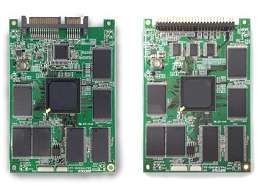May 15, 2012 report
Buffalo shows SSDs with MRAM at Japan show

(Phys.org) -- Japan-based storage experts, Buffalo, has introduced a new line of solid state drives (SSDs) that use MRAM cache (instead of standard SDRAM). The company’s new line of solid state drives went on show this month in the form of a 4-Gbyte SSD equipped with an 8-Mbyte MRAM cache memory at the Embedded Systems Expo in Japan, which ran from May 9 to May 11. The show is an important gathering of the latest technologies, systems integration platforms and development platforms serving embedded systems. Buffalo’s initial targeted end users for its MRAM line are to be corporate customers in industrial settings requiring high reliability.
MRAM is said to resist high radiation and can operate in extreme temperature conditions, suited for military and space applications. MRAM stands for magnetoresistive random-access memory. This is a non-volatile random-access memory technology. Supporters say MRAM will eventually be a dominant memory technology because of impressive benefits.
Once capacitors used in DRAM lose their charge over time, memory assemblies that use DRAM need to refresh all the cells in their chips approximately twenty times a second; MRAM never requires a refresh. MRAM retains its memory with the power turned off; there is no constant power draw.
According to MRAM-Info.com, the MRAM chips that were showcased by Buffalo at the Japan show are probably made by MRAM maker, Everspin Technologies. Everspin has touted MRAM as a technology that enhances data center and networking fault recovery, reducing system downtime and simplifying system design, for an overall lower total cost of ownership.
Meanwhile, other industry observers say that MRAM is a “niche” technology, as its relatively high costs prevent it from competing head-on with more popular memory technologies such as flash and DRAM. On the other hand, MRAM supporters call it the next-generation memory technology. They also say that it is now gaining wider acceptance, and that MRAM is a serious challenger to the status quo in semiconductor memory.
“MRAM is the holy-grail of memory: it can provide high-density non-volatile memory that is extremely fast and can replace all kinds of memories used today in a single chip,” says MRAM-Info.com. According to reports, Dell and LSI are putting MRAM from Everspin Technologies into their storage systems.
Another sign of MRAM interest is that, earlier this year, Spin Transfer Technologies raised $36 million in pursuit of OST-MRAM, which stands for orthogonal spin transfer magnetoresistive random access memory. Spin Transfer Technologies was established by Allied Minds and New York University to develop and commercialize its OST-MRAM technology. The company says implications of the technology for the development of spin transfer MRAM devices include faster switching times, lower power operation and scalability to smaller dimensions.
More information: buffalomemory.jp/news/120508a.html (in Japanese)
© 2012 Phys.Org


















